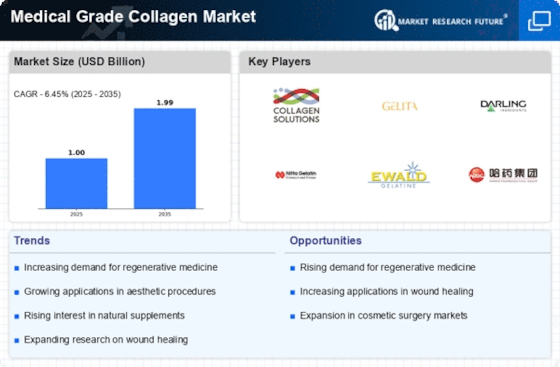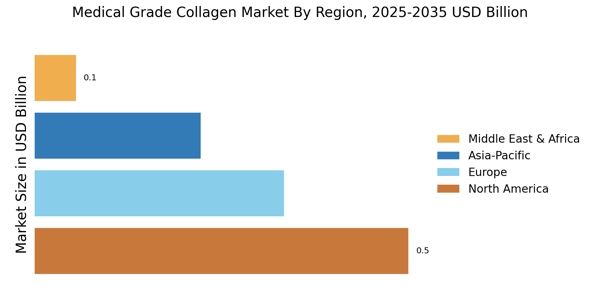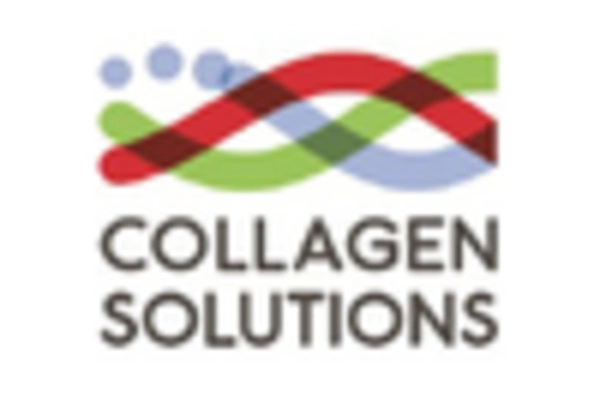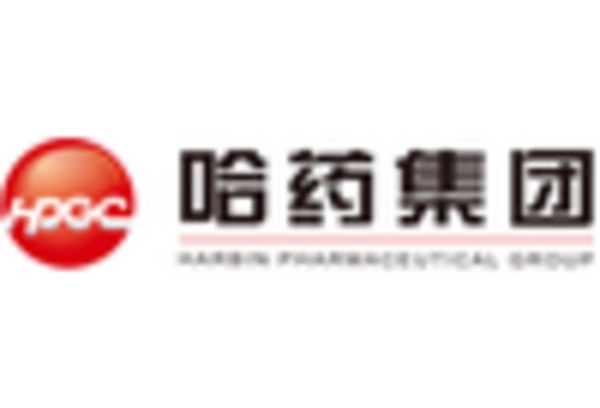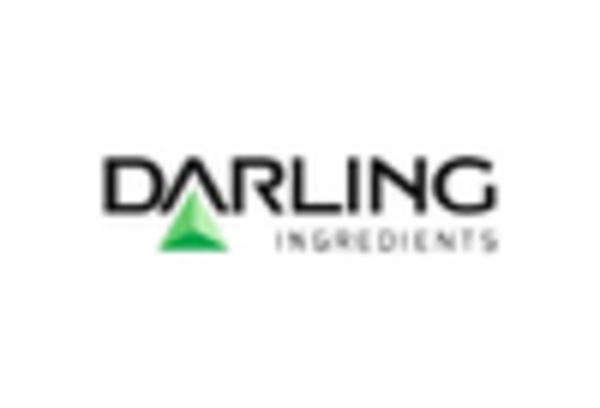Advancements in Biotechnology
Advancements in biotechnology are playing a pivotal role in shaping the Medical Grade Collagen Market. Innovations in extraction and purification techniques have led to the development of high-quality collagen products that meet stringent regulatory standards. These advancements not only enhance the efficacy of collagen but also ensure its safety for medical applications. The integration of biotechnology in collagen production is expected to drive market growth, as it allows for the creation of tailored solutions for various medical needs. Furthermore, the increasing focus on personalized medicine may lead to a rise in demand for customized collagen formulations, thereby expanding the market landscape. As a result, the Medical Grade Collagen Market is likely to benefit from these technological advancements, fostering a competitive environment.
Rising Incidence of Chronic Wounds
The rising incidence of chronic wounds is a significant driver for the Medical Grade Collagen Market. Chronic wounds, such as diabetic ulcers and pressure sores, pose a considerable healthcare challenge, necessitating effective treatment options. Medical-grade collagen is recognized for its wound healing properties, promoting tissue regeneration and reducing healing time. The increasing prevalence of diabetes and an aging population are contributing to the growing number of chronic wound cases. According to recent statistics, the global burden of chronic wounds is expected to escalate, thereby driving demand for collagen-based wound care products. This trend underscores the importance of the Medical Grade Collagen Market in addressing critical healthcare needs and improving patient outcomes.
Increasing Applications in Aesthetic Procedures
The Medical Grade Collagen Market is experiencing a notable surge in demand due to its increasing applications in aesthetic procedures. Collagen is widely utilized in dermal fillers, skin rejuvenation, and anti-aging treatments. As consumers become more conscious of their appearance, the desire for non-surgical cosmetic enhancements is likely to grow. Reports indicate that the aesthetic segment is projected to account for a substantial share of the market, driven by innovations in formulation and delivery methods. The rise of social media and beauty influencers further amplifies this trend, as individuals seek to emulate the looks of their favorite personalities. Consequently, the Medical Grade Collagen Market is poised for growth as it aligns with the evolving preferences of consumers seeking effective and minimally invasive aesthetic solutions.
Expansion of Research and Development Activities
The expansion of research and development activities is a crucial driver for the Medical Grade Collagen Market. Ongoing research into the therapeutic applications of collagen is uncovering new possibilities for its use in various medical fields, including orthopedics, dermatology, and tissue engineering. Increased investment in R&D is fostering innovation, leading to the development of novel collagen-based products that address unmet medical needs. Furthermore, collaborations between academic institutions and industry players are likely to enhance the pace of discovery and application of medical-grade collagen. As new applications are identified, the Medical Grade Collagen Market is expected to witness significant growth, driven by the continuous evolution of product offerings and the exploration of new therapeutic avenues.
Growing Interest in Natural and Biocompatible Products
There is a growing interest in natural and biocompatible products within the Medical Grade Collagen Market. Consumers and healthcare professionals are increasingly favoring products derived from natural sources, as they are perceived to be safer and more effective. Medical-grade collagen, often sourced from bovine or porcine origins, aligns with this trend, offering a biocompatible solution for various medical applications. The shift towards natural products is further supported by rising awareness regarding the potential side effects of synthetic alternatives. As a result, manufacturers are focusing on developing collagen products that meet the demand for natural ingredients, thereby enhancing their market position. This trend is likely to propel the Medical Grade Collagen Market forward, as it caters to the evolving preferences of consumers seeking safer and more effective treatment options.


